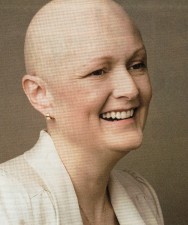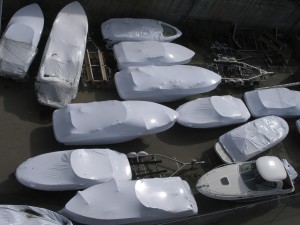Jessica’s Adventure
Jessica Douglas-Henry has been making documentaries since the early 1990s. Until recently, Jessica’s company, Iris Pictures, moved along in an organic, word-of-mouth way, building a reputation for sensitive and probing work that explored different aspects of human experience.
In 2007, Jessica bought out her long-time business partner and re-oriented her company to seek out new markets for documentary film work. The unexpected influence of the company’s new investor, has challenged Jessica to think about how the medium she loves and has built her life around can be taken in new directions.
Exuding competence and a quiet, sometimes introspective intensity, Jessica is surprisingly candid about her struggle with change. Over lunch, in the ground floor café of a converted flour mill in the Sydney inner city suburb of Newtown where Iris Pictures has its studio, Jessica and I discuss what filmmaking means to her and how things have changed over the last couple of years. I start by describing sisu, using the lovely analogy Jørn Utzon’s Finnish carpenters gave him during the intense days leading up to his dismissal, as that ‘something extra you pull out of yourself’. I ask Jessica if she can describe the ‘something extra’ she has had to pull out of herself to keep going, and she responds without missing a beat.
“That’s easy,” she says, “overcoming fear. For me it’s always been about fear. There are levels of fearfulness, and it’s about saying each time: ‘I can put that aside and move forward, I can get over that’. As you get older it does become easier, you’ve had more failures and hopefully your ego is not as fragile, so it is possible to view things from a much more chilled perspective. I’ve found change really challenging, which is rooted very deeply in my childhood, and I know it sounds ridiculous to say, but change is constant and learning to acknowledge this and work with it rather than resisting it, has been a big thing for me.”
making it up as you go along
Choosing a career in the volatile film and television industry has been a good, if confronting, training ground and Jessica uses the term ‘shape-shifter’ often to describe the flexibility and responsiveness both she and her company have had to cultivate in order to survive.
Sticking to her craft has paid off. There have been accolades and awards for her work, but of equal value is the insight she now has into herself.
“For years as a director, I felt like a bit of a fraud,” she reflects. “A filmmaker friend of mine used to describe the process of film-making in Australia at that time (in the 1980s) as like waking up every day and strapping on a suit of armour to get out there and mix it with your peers, because it was such a tough world. It was at a time when feminism was yet to really rattle the cage. I felt a bit like that, I felt like I didn’t really know what I was doing, I got out there and did it, but there was a persistent lack of confidence underneath. Although I still feel like I’m not sure what I’m doing some of the time, it doesn’t actually bother me now. If you want to grow personally and professionally, you have to operate outside your comfort zone because otherwise you don’t grow. The whole thing about operating outside your comfort zone is that it’s not safe; you can’t feel secure because you don’t know what you’re doing, you’re operating outside your normal sphere of safety. Ipso facto, if you’re operating outside your comfort zone, you can’t know what you’re doing. To a degree, you’re making it up as you go along. As you get older, the ego is less bound up in the potential for failure so failure does not have the same impact, it’s not the same punch to the solar plexus it once was.”
search for the cash cow
This visceral fear of the unknown is something we all experience at times and either run from or run towards depending on how great our need for self-expression. What has lured Jessica on? What has fed her imagination?

Anna McDonald
In her case, once again, the answer is immediate: the power of film. That privileged access the documentary filmmaker has to the intimate spaces of people’s lives and the opportunity to work with creative and impassioned peers. It’s about story telling, she says, citing her most recent film, Anna’s Adventure, as the embodiment of everything that first drew her along this path and kept her there.
While Iris Pictures started out by specialising in educational and corporate filmmaking, the focus gradually shifted to the long-running broadcast series. A growing reputation in the field and a number of award-winning projects, reinforced the belief that this was the strategy to stick to, in spite of the fickle and bruising character of the market they were trying to woo.
“We were always looking for the cash cow, finding a stable income that would underpin the business,” says Jessica. “And, in general, it has always eluded us. But the irony is that I think it’s been under our noses all the time.”
Like many small businesses, the company could ill afford the time needed to do some systematic strategic thinking when just surviving soaked up all available resources. Enter the scene – the company’s new investor, a big picture thinker with a finance and property background, whose fresh eyes have brought a completely different way of thinking to how the company can grow.
“We’ve always had to be flexible and agile to deal with the changing nature of the film and television industry; but we’ve not always been strategic,” explains Jessica. “I described what we did and he made notes and diagrams, which looked like complete gobbledygook to me. After two meetings he said: ‘Here is your industry’. I looked at what he had drawn and couldn’t make head nor tail of it.”
film maker to CEO
As a hidden palimpsest began to emerge, it simultaneously took Jessica by surprise and made good strategic sense. The demand for compelling visual communication that can educate, simplify and persuade, has intensified across all industries. Revisiting the past, in this case the corporate, non-government and educational sector, has helped Jessica uncover a pathway previously obscured. But it hasn’t been easy. It’s meant that Jessica and her team have adopted a more systematic, traditionally masculine way of generating new business. Everyone in the office has a quota of calls to make each day and while many fall on stony ground, it is satisfying when meetings are made and project possibilities canvassed.
“The work we’ve been doing over the last few years has been about coming up with an idea and pitching it to a broadcaster, it’s flying such a kite,” Jessica reflects. “So this recent approach is really good for everyone, it’s very results based.“
There is a jaunty pleasure in Jessica’s mellifluous voice as she describes these behavioural and structural changes; as if she has left behind something she once feared and is now enjoying the novelty of discovering she’s good at it. The same infectious tone infuses her description of the differences between directing a film crew and managing a growing business.
“A documentary is like throwing a spear, it has a trajectory and lands somewhere, it has a destination and is following an arc; whereas a company is like a herd of wild beasts thundering over a plain,” says Jessica. We both laugh at the unexpected truth these metaphors reveal. This passage from film to managing director, which she once thought would be identical, has turned out to be far more complex than she realised. And that’s been good, because she has been fascinated and stretched by the ‘shape-shifting’ beast she now commands.
“The human resources stuff, the contractual elements, the financial imperatives, the forward planning, converting the tries….it’s

little flotilla of coracles…
huge, really big and with a small business the challenges are even greater than being the CEO of QANTAS or Westpac, where as long as you are a good delegator and not a micro manager, you have the resources at your disposal to focus on steering the ship. What I’m doing is like a little flotilla of coracles, all trying to get over the channel.”
time to give back
The transition from micro business to traditional company structure has enabled Iris Pictures to spread its wings, but it’s clear from our conversation that Jessica Douglas-Henry will never succumb to anodyne managerial orthodoxies. She is far too passionate, intelligent and original. Her primary love is film and its unique ability to provide a kind of emotional shorthand for the social values she believes in.
Whether it’s about how to recognise learning and developmental delays in small children, the brave journey of medical pioneer Anna McDonald, or about the experiment in positive psychology underway at Geelong Grammar School – the common denominator, for Jessica, is “being able to use the medium of film to elegantly communicate powerful and important messages. You try not to over-sauce the pudding, you try not to do too much, but if you’re really clear about what the key objectives are, the three main things, then you can do something really special.”
While she only ever wanted to be a writer-director, growing Iris Pictures has propelled Jessica further from her first love and out of her comfort zone, but it’s also giving something back.
“My priorities have shifted,” she concludes. “The things that concerned me as a younger woman, the things I set great store by, are no longer so important. I’m seeking other ways to be creative. I’ve certainly learnt to do more than one thing at once and I think it has enabled me to get a sense of perspective that I didn’t have before. I’m a detail person but as I get older I’ve developed the capacity to see a bigger picture. It’s something that you either have innately or you develop as you get older, that capacity to recognise patterns and meaningful connections that you never saw before because you were too close. I’ve also gained different forms of relationships, I get enormous satisfaction out of working with talented young people now and helping them to grow. It’s fabulous and I love it.”



